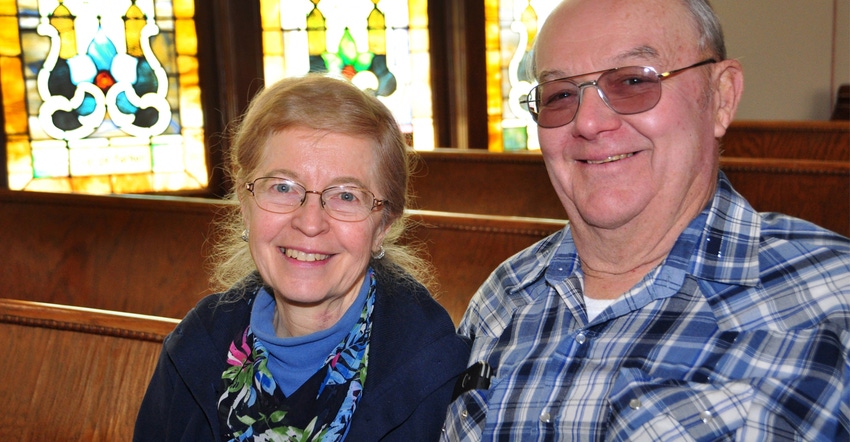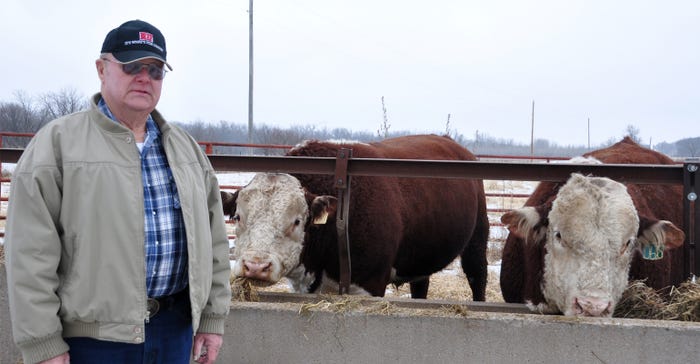March 3, 2020

A purebred Hereford cattle herd put Dick Godfrey through college. “I built the herd in 4-H,” Dick says, “and ran my cows in the fall, while Dad ran his in the spring. That way we could double up on the use of bulls.”
“I sold the cattle off as needed to pay for my education,” the Mills County farmer, cattleman and 2020 Iowa Master Farmer says, “and graduated from ISU with no cattle and no debt.”
Still, Dick found it difficult to get into farming in 1970. “The opportunity just wasn’t there for me to farm when I got out of college,” he says. “Everything was sky-high.”
Dick and wife Rita married in 1971 and lived for a time in Council Bluffs, where she worked at the public library, while Dick worked for the Soil Conservation Service, then in the proof department of a bank and in real estate before becoming a loan officer for the Federal Land Bank in Red Oak, where they moved in 1975. “I saw a lot of spending in the good times of the 1970s, but then interest doubled, crop prices went down, and I saw a lot of debt,” Dick recalls.
He and Rita bought, fixed up and sold a couple of houses while they worked off the farm for nine years. “That helped us buy our first line of equipment,” Dick says.“And without any debt, we started renting two different farms, and bought some bred gilts and cows.”
They moved back to the home neighborhood near Henderson in 1986 and left the hog business in 1993 to return to the homeplace to build their cow herd in earnest. That’s the year Dick’s parents, Don and Ruby, retired and moved to Emerson.
Cattle legacy traces to England
Dick is the fifth generation of Godfrey cattlemen, but only the third in this country. His great-grandfather Harry and great-great-grandfather Henry raised cattle on their small farms in England. Dick and Rita’s business is named Glass House Farms Ltd., after Glass House Farm, where his grandfather Walter lived as a boy before he immigrated to Mills County in 1909 to work on a cattle ranch.
“Dad had cattle and then helped us with the crops for years after he retired, so we could concentrate on cattle,” Dick says. “He was active up until several years ago. He and mom will have their 95th and 94th birthdays this year.”
Growing the herd
Dick and Rita grew their cow herd to over 140 cows, renting most of their pastureland.
“At one time we had a 21-mile route to travel each morning to check the cattle in all the pastures,” Dick says.
He tried all breeds of bulls, settling on Herefords some 25 years ago to crossbreed with black and black whiteface cows for high-performing feeders. The herd gradually transitioned to all black cows, as Dick bought first-calf and second-calf heifers.
Rita does the financial and statistical record keeping and helps with cattle chores. The couple gradually sold off some cows and stopped renting pasture to ease their workload and to accommodate Dick’s off-farm volunteer work. They currently run around 50 cows with two bulls on 80 acres of owned pasture, rent out some cropland, and grow corn and soybeans on about 300 more acres.
Payback for opportunities
Dick is serving a two-year term as president of the Iowa Cattlemen’s Association, following two years as president-elect. After his service as president, he’ll stay on the board as past president. This office means traveling across the country to National Cattlemen’s Beef Association meetings, as well attending many other meetings for the cattle producers at the state and county level.

DOCILE BULLS: After trying all breeds for many years, Dick Godfrey concluded Hereford bulls are the most docile, and crosses them with black cows to produce offspring that perform well in the feedlot.

Dick has given back to the cattle industry locally, regionally and statewide. He says he reckons he helped cook thousands of beef servings a year for many years with the Mills-Montgomery Cattlemen, and worked at the Beef Quarters, the Cattlemen’s restaurant, at the Iowa State Fair for 20 years.
“An awful lot of what I do is payback for the opportunities I had years ago,” Dick says. “I’ll always be grateful to 4-H for helping me learn how to meet people and talk to them,” he says. “And cattle have been good to me over the years. I want the next group of beef producers to have the same opportunities.”
Dick also served on the Iowa 4-H Foundation board for seven years and has supported 4-H financially. He has been a member of local 4-H youth committees in two counties, volunteered as beef superintendent at the county fair, judged 4-H record books locally, reviewed scholarship applications at the state level, was on the Mills County Farm Bureau board, and supported Mills County Extension.
Dick has also been on the board of trustees and administrative board at their neighborhood church, Wesley Chapel, where Rita taught Sunday school for a number of years and participates in music as a pianist and soloist and in Bible studies.
Betts writes from Johnston, Iowa.
About the Author(s)
You May Also Like




